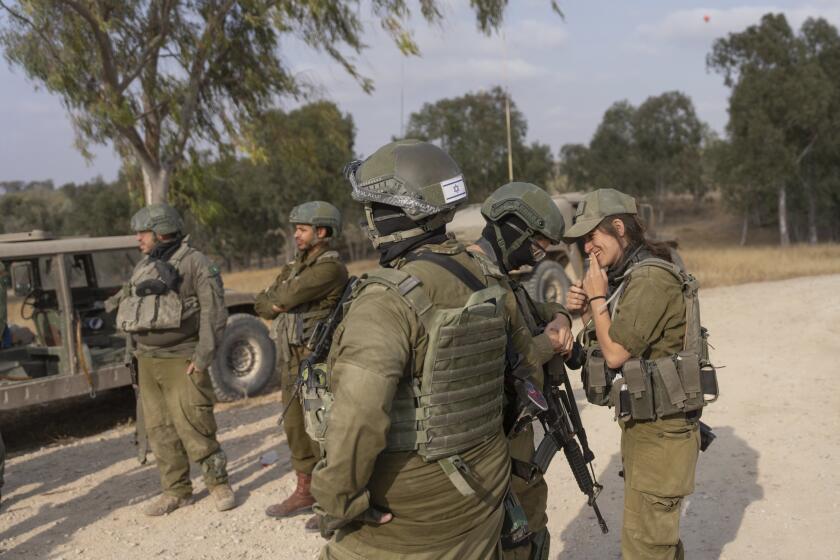U.S. Wary Until New Palestinian Leader Curbs Militias’ Influence
Although Bush administration officials see the Palestinian election as an important opportunity to work toward Middle East peace, they will move cautiously until they are convinced that the new president can curb extremist violence, State Department officials said.
The United States will focus its immediate efforts on supporting the Israeli withdrawal from the Gaza Strip planned for this summer, officials said. The U.S. may also resume providing direct aid to the impoverished area and training for Palestinian security forces.
“We are not going to stand by and let this government fail,” a State Department official said. “Additional assistance will certainly be considered.”
But Washington still wants progress from the new Palestinian Authority government in taming the activities of the militant organizations Hamas and Islamic Jihad, even if the post of president goes to U.S. favorite Mahmoud Abbas, also known as Abu Mazen.
However, administration officials are trying to damp expectations of a dramatic breakthrough. They believe that the new Palestinian leadership may need time to get its house in order.
However, two Middle Eastern diplomats warned that without the Bush administration’s aggressive support and willingness to push Israel toward peace talks, a President Abbas is likely to fail in diplomacy.
The margin of Abbas’ expected victory in Sunday’s election is considered crucial, and the Bush administration is hoping for a decisive win. Outsiders, however, warn that a boycott of the election by Hamas may leave Abbas with a fragile majority and a weak power base.
It would be misguided to overestimate Abbas’ power, a senior Middle Eastern diplomat said. “He’s going to find it very hard to steer the Palestinian people, and that will require an intensive effort from the American administration, to exert more [pressure] on both the Israelis and the Palestinians.”
Arab officials have long accused the White House of supporting Israeli Prime Minister Ariel Sharon’s uncompromising stance toward the Palestinians.
“If they keep pushing the Palestinians to the limit, the first scapegoat will be Abu Mazen himself, and if Abu Mazen goes, you’ll find yourself in real civil strife,” the diplomat said. Other Palestinian Authority leaders, including Prime Minister Ahmed Korei, he explained, would be even weaker than Abbas and less able to counter the militants’ influence.
Abbas will have a six-month honeymoon with the Palestinian people, but during that period he will be expected to deliver tangible results, the second diplomat said. These include an Israeli withdrawal from the Gaza Strip, improved security in Gaza and the West Bank and freedom for perhaps 5,000 of the 7,000 Palestinian prisoners held by Israel, he said.
The first two goals are possible, but Sharon is unlikely to agree to the third without strong pressure from Washington, the diplomat said.
On the campaign trail, Abbas has been calling for immediate negotiations with Sharon on restarting a U.S.-backed peace plan, which envisions Israeli and Palestinian states.
The Bush administration believes that dialogue between the two sides should resume, and supports an Egyptian effort to sound out Hamas and other extremist groups about their conditions for a cease-fire, the State Department official said.
But asked whether Washington would pressure Sharon to agree to talks, the official said, “I just can’t speculate on whether it will be pressure, encouragement, cajoling or whatever.”
The administration will be judging Abbas not on his campaign rhetoric but in part on his Cabinet appointments.
“Are there going to be terrorist elements as part of the government and the Cabinet?” the State Department official said. “The barometer for us is not the results of the election, it’s the policies that the government pursues.... If they were able to move boldly in a new direction, then yes, we’ll be ready to respond in kind.”
Lawmakers and Middle East experts are hopeful that Palestinian leader Yasser Arafat’s death, the Palestinian election and Sharon’s decision to pull out of Gaza all will help jump-start the moribund peace process.
“There’s a sense of optimism right now,” said a Senate Foreign Relations Committee staff member. “With that optimism comes a view that [Secretary of State-designate Condoleezza] Rice and the White House will be much more engaged” in brokering a settlement. Senators will probably question Rice extensively about her strategy for Middle East peace at her Jan. 18 confirmation hearing.
The United States has committed $850 million to Palestinian aid since 1998. But only about $450 million has been spent in Palestinian areas, largely because violence by militants and the Israeli armed forces has made it impossible for U.S. aid programs and nongovernmental groups to operate safely in the occupied territories.
U.S. officials remain wary because of suspicions that aid to the Palestinian Authority was misused and that some Palestinian security troops trained by the U.S. ended up fighting alongside the extremists.
“Don’t look for us to be opening up the floodgates of U.S. assistance if there is still a risk that that aid is going to be funneled off toward those who support violence,” the State Department official said.
More to Read
Start your day right
Sign up for Essential California for news, features and recommendations from the L.A. Times and beyond in your inbox six days a week.
You may occasionally receive promotional content from the Los Angeles Times.






